Why consider protein supplementation?
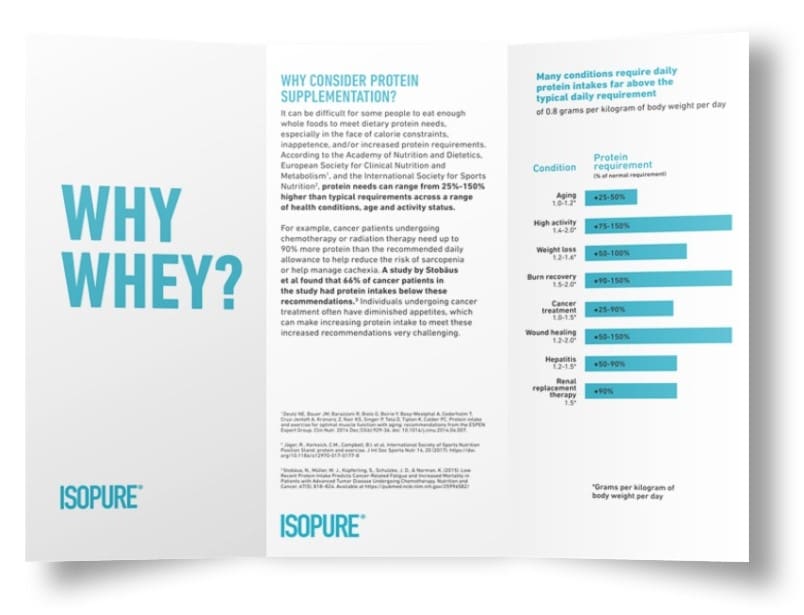
It can be difficult for some people to eat enough whole foods to meet dietary protein needs, especially in the face of calorie constraints, inappetence, and/or increased protein requirements. According to the Academy of Nutrition and Dietetics, European Society for Clinical Nutrition and Metabolism1, and the International Society for Sports Nutrition2, protein needs can range from 25%-150% higher than typical requirements across a range of health conditions, age and activity status.
For example, cancer patients undergoing chemotherapy or radiation therapy need up to 90% more protein than the recommended daily allowance to help reduce the risk of sarcopenia or help manage cachexia. A study by Stobäus et al found that 66% of cancer patients in the study had protein intakes below these recommendations.3 Individuals undergoing cancer treatment often have diminished appetites, which can make increasing protein intake to meet these increased recommendations very challenging.
Many conditions require daily protein intakes far above the typical daily requirement of 0.8 grams per kilogram of body weight per day
*Grams per kilogram of body weight per day
When getting enough protein from food is a challenge, protein supplements offer simple, flexible, convenient, and cost-effective means to add high-quality, complete proteins to help bridge the protein gap.
Not all proteins are the same
Whey is a high-quality, highly bioavailable protein that contains all nine of the essential amino acids in sufficient quantities to support muscle protein synthesis.
| Type | Whey protein | Soy protein | Casein | Milk | Egg | Beef | Wheat protein |
| Protein quality (biological value*) | 104 | 74 | 77 | 91 | 100 | 80 | 64 |
*Biological value refers the proportion of dietary protein retained in the body for growth and/or maintenance. Source: Hoffman JR, Falvo MJ. Protein - Which is Best? J Sports Sci Med. 2004 Sep 1;3(3):118-30. Available at https://www.ncbi.nlm.nih.gov/pmc/articles/PMC3905294
How is whey protein made?
Whey protein is a type of protein isolated from milk

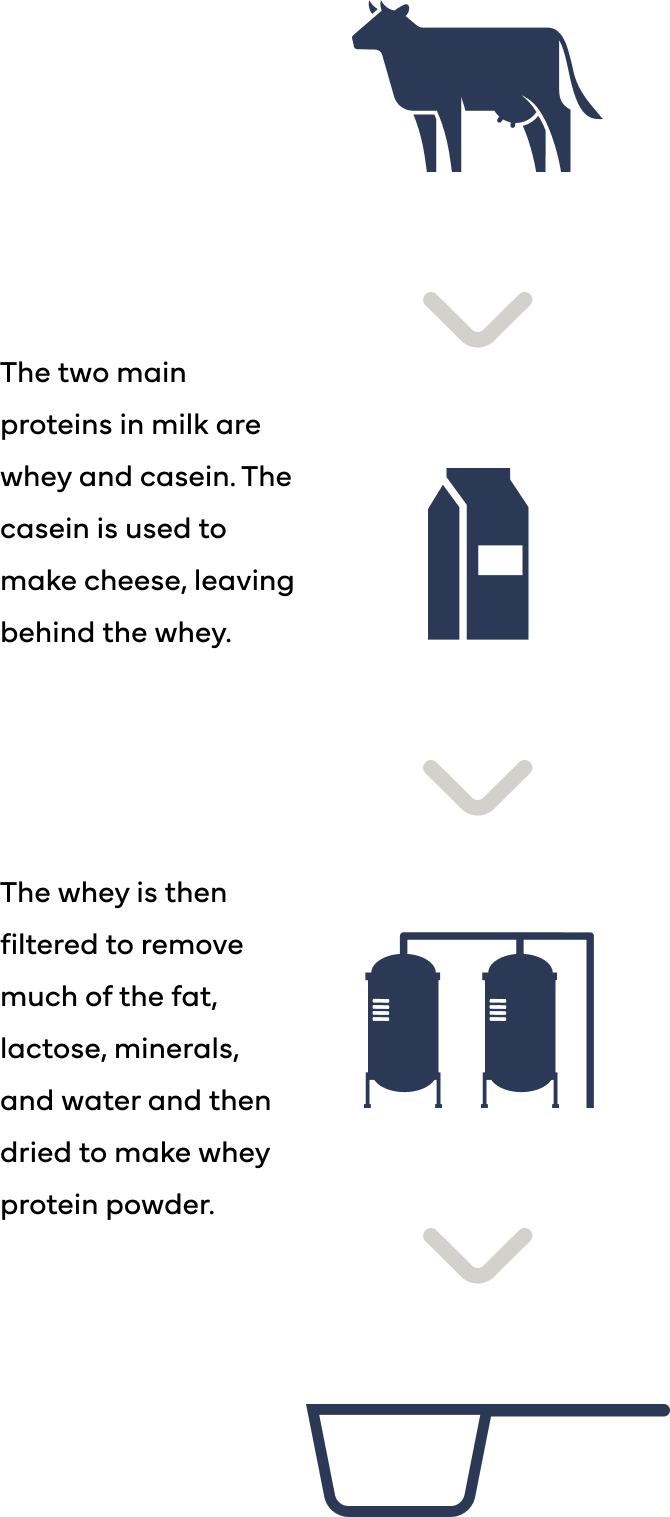
Which whey is for you?
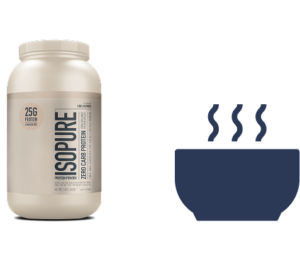
ISOPURE® Zero Carb Unflavored Protein Powder - A great choice to add small amounts of protein to foods & beverages throughout the day, or add a scoop to a smoothie.
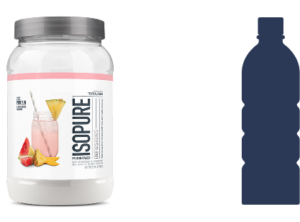
ISOPURE INFUSIONS® Protein Powder - Translucent whey protein to add protein and flavor to water. A quarter scoop will lightly flavor your water and add ~5g, or try a full scoop in 16oz water for full flavor and 20g of protein.
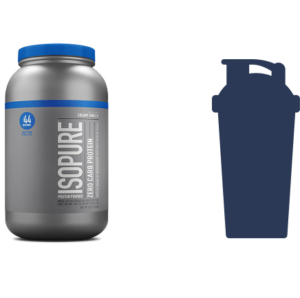
ISOPURE® Zero/Low Carb Protein Powder - Flavored whey protein isolate with a blend of vitamins and minerals. Can be helpful to fill nutrient gaps if patients are replacing food with protein shakes.
For over 35 years, ISOPURE® has been a leader in delivering nutrition solutions made simple. Our limited ingredient protein formulas are made with complete, high quality 100% pure whey protein isolate and contain 0 g added fats or sugars. Whether adding ISOPURE® Zero Carb Unflavored Protein Powder to favorite recipes, enriching water with ISOPURE INFUSIONS® Mixed Berry Protein Powder, or blending Creamy Vanilla ISOPURE® zero carb protein into smoothies, our products are designed to help your patients meet their protein needs, wherever they are.
Glanbia – The Protein Experts
Glanbia, an Irish global nutrition group, is the world’s #1 producer of whey protein isolate. Glanbia is the parent company of a group of companies including Glanbia Nutritionals and Glanbia Performance Nutrition, home to ISOPURE® and OPTIMUM NUTRITION®, the #1 sports nutrition brand in the world.*
Glanbia is an Irish word that means ‘pure food’ and we have a long, rich heritage that runs all the way back to the early 1900s. Today our consumer brands and ingredients reach over 120 countries and nourish millions of people around the world. We are dedicated to delivering thoughtful nutrition solutions for every step of life’s journey.
1 Deutz NE, Bauer JM, Barazzoni R, Biolo G, Boirie Y, Bosy-Westphal A, Cederholm T, Cruz-Jentoft A, Krznariç Z, Nair KS, Singer P, Teta D, Tipton K, Calder PC. Protein intake and exercise for optimal muscle function with aging: recommendations from the ESPEN Expert Group. Clin Nutr. 2014 Dec;33(6):929-36. doi: 10.1016/j.clnu.2014.04.007.
2 Jäger, R., Kerksick, C.M., Campbell, B.I. et al. International Society of Sports Nutrition Position Stand: protein and exercise. J Int Soc Sports Nutr 14, 20 (2017). https://doi.org/10.1186/s12970-017-0177-8
3 Stobäus, N., Müller, M. J., Küpferling, S., Schulzke, J. D., & Norman, K. (2015). Low Recent Protein Intake Predicts Cancer-Related Fatigue and Increased Mortality in Patients with Advanced Tumor Disease Undergoing Chemotherapy. Nutrition and Cancer, 67(5), 818–824. Available at https://pubmed.ncbi.nlm.nih.gov/25996582/
* Source: Source Euromonitor International Limited; Consumer Health 2024 Edition, Sports Nutrition category, %retail value shares, 2023 data


